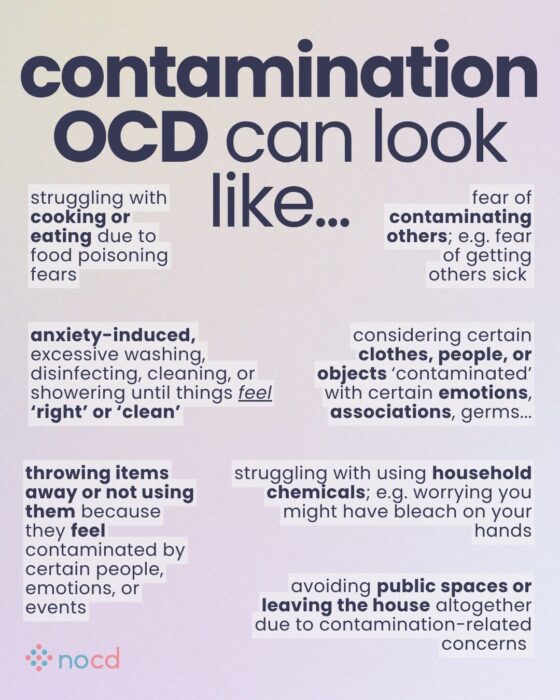Contamination OCD is a form of obsessive-compulsive disorder (OCD) that causes an intense fear of germs, illness, or becoming “contaminated” by certain substances, people, or environments. These fears often lead to excessive cleaning, handwashing, or avoidance behaviors that interfere with daily life.
While most people worry about germs occasionally, contamination OCD goes far beyond normal concern—it’s driven by intrusive thoughts and anxiety that cause significant distress. People may spend hours cleaning, changing clothes, or avoiding physical contact to feel “safe.”
Research reveals that 26% of people with OCD report experiencing obsessive thoughts about catching an illness or spreading germs.
What is contamination OCD?
Contamination OCD is a subtype of obsessive-compulsive disorder characterized by intrusive fears of germs, dirt, illness, or impurity—and the compulsions used to neutralize those fears.
People with this OCD subtype may excessively wash, clean, or disinfect to prevent perceived contamination or avoid certain situations altogether. These compulsive behaviors may temporarily relieve anxiety, but ultimately reinforce the OCD cycle.
Types of contamination OCD
Contamination fears can take many forms, and understanding them helps tailor treatment.
Common types include:
- Germ or illness contamination: Fear of catching or spreading disease.
- Chemical contamination: Fear of harmful substances like cleaning products or toxins.
- Food contamination: Fear that food may be spoiled, touched, or poisoned, leading to repetitive checking or avoidance.
- Emotional contamination: Feeling internally “dirty” after contact with certain people, memories, or ideas.
- Symbolic contamination: Fear that objects or places linked to “bad” memories carry contamination or moral impurity.
Each form causes significant distress, but all share the same underlying OCD cycle: intrusive fear → anxiety → compulsion → temporary relief → stronger fear.
What are the symptoms of contamination OCD?
Contamination OCD symptoms include intrusive fears about germs or impurity and repetitive behaviors aimed at preventing or removing perceived contamination. These symptoms often interfere with daily routines, work, and relationships.
Common obsessions in contamination OCD
- Fear of catching or spreading illness.
- Fear that surfaces, money, or other people carry dangerous germs.
- Fear of chemicals, mold, or “invisible dirt.”
- Fear that certain people or memories have made you “unclean.”
- Fear that eating, touching, or breathing near something contaminated will cause harm.
Common compulsions in contamination OCD
- Excessive handwashing, showering, or cleaning.
- Avoiding public places or certain people.
- Changing or washing clothes frequently.
- Using gloves, wipes, or sanitizer excessively.
- Seeking reassurance from others about cleanliness or safety.
- Mentally reviewing or praying to “purify” oneself.
What causes contamination OCD?
While there’s no single cause of contamination OCD, it can arise from a combination of genetic, neurological, and environmental factors that affect how the brain processes fear and uncertainty.
Common contributors include:
- Genetic predisposition: First-degree relatives of people with OCD are at higher risk, suggesting a hereditary component.
- Brain circuitry differences: Overactivity in brain areas responsible for threat detection and error monitoring can make intrusive thoughts feel urgent and impossible to ignore.
- Environmental triggers: Illness, trauma, or stressful life events may spark the onset of contamination fears.
Is it contamination OCD or health anxiety?
Contamination OCD and health anxiety both involve fears about illness, but they differ in what drives those fears and how people respond.
Here’s a look at the differences between the two conditions:
| Feature | Contamination OCD | Health anxiety |
| Core fear | Being contaminated or spreading germs | Already having or developing a serious illness |
| Typical compulsions | Cleaning, washing, avoiding contact, and sanitizing | Checking symptoms, researching diseases, and doctor visits |
| Focus | External sources of contamination | Internal bodily sensations |
| Treatment | Exposure and response prevention (ERP) therapy | Cognitive behavioral therapy (CBT) focusing on body-based fears |
These conditions overlap, but in contamination OCD, compulsions focus on avoiding contamination. In health anxiety, the focus is on seeking reassurance about developing health concerns.
How does contamination OCD affect daily life?
Contamination OCD can disrupt everyday functioning. People may spend several hours washing or cleaning, avoid work or social events, or restrict contact with loved ones. Some people struggle to eat normally due to fears of food contamination. Relationships may also become strained when loved ones are drawn into reassurance or cleaning rituals. Over time, avoidance can shrink a person’s world, reinforcing both fear and isolation.
These repetitive behaviors don’t happen because someone wants to be overly cautious—they’re attempts to quiet relentless anxiety and uncertainty. Unfortunately, the short-term relief from compulsions only strengthen OCD’s grip, and the intrusive thoughts get louder over time. With the right treatment, it’s possible to break that cycle and start rebuilding a sense of safety and freedom in daily life.
How is contamination OCD diagnosed?
There’s not a separate diagnosis for contamination OCD, but a licensed mental health professional—such as an OCD specialist—can deliver a diagnosis using a structured interview and evidence-based assessment tools:
- Yale-Brown Obsessive Compulsive Scale (Y-BOCS)
- Dimensional Obsessive-Compulsive Scale (DOCS)
- Structured Clinical Interview for DSM-5 (SCID)
- Obsessive-Compulsive Inventory-Revised (OCI-R)
While not a replacement for an official diagnosis, you can take a contamination OCD test to see if your symptoms align with the subtype. You’ll still want to visit with an OCD specialist, but the results can help you determine if you’re showing signs of the condition.
How to treat contamination OCD
Contamination OCD is highly treatable with evidence-based treatments that can help break the cycle of intrusive thoughts and compulsions.
Exposure and response prevention (ERP) therapy for contamination OCD
The most effective treatment for OCD is exposure and response prevention (ERP) therapy. ERP is a specialized form of CBT proven to be effective for OCD. General CBT, if not tailored for OCD, can sometimes be unhelpful or even worsen symptoms.
ERP involves carefully exposing yourself to fearful thoughts and situations while resisting the urge to engage in compulsions. Over time, you learn how to tolerate discomfort and uncertainty without falling back on compulsive behaviors to cope.
Here are some examples of potential contamination OCD exposures your ERP therapist may recommend:
| Theme | Exposure example | Response prevention technique |
| Germ contamination | Touch a public door handle without washing your hands immediately. | Resist washing or using hand sanitizer afterward and tolerate the discomfort. |
| Bathroom contamination | Use a public restroom and refrain from washing your hands for a specified period. | Avoid excessive handwashing or wiping surfaces repeatedly. |
| Household contamination | Touch a trash can or a cleaning rag and then touch other items in your home. | Refrain from sanitizing or changing clothes afterward. |
| Food contamination | Eat food that briefly touched a countertop or plate you believe might be “unclean.” | Avoid inspecting, re-washing, or discarding the food. |
| Bodily fluids | Touch your own sweat, saliva, or hair without cleaning right away. | Refrain from immediate washing or reassurance-seeking. |
| Chemical contamination | Handle cleaning supplies or household chemicals without wearing gloves. | Avoid washing excessively or changing clothes. |
| Emotional contamination | Touch an object that belonged to someone you consider “bad” or “unlucky.” | Refrain from cleansing rituals or avoidance. |
| Religious/moral contamination | Hold or use an item associated with a situation you perceive as morally impure. | Resist the urge to seek mental reassurance or repeat prayers to feel “clean.” |
Studies show that ERP therapy is highly effective, with 80% of people with OCD experiencing a significant reduction in their symptoms.
Other approaches that may help include:
- Medication (typically SSRIs)
- Mindfulness-based strategies
- Acceptance and commitment therapy (ACT)
These are typically done in combination with ERP therapy, depending on the individual’s needs.
Treatment for severe or treatment-resistant contamination OCD
For people whose contamination fears don’t fully respond to ERP or medication, additional options are available.
These may include:
- Intensive outpatient programs (IOPs)
- Partial hospital programs (PHPs)
- Residential treatment centers (RTCs)
- Transcranial magnetic stimulation (TMS)
- Deep brain stimulation (DBS)
- Gamma knife radiosurgery (GKRS)
How to treat contamination OCD at home
The following self-help strategies are often recommended by therapists for people to practice their ERP skills at home between sessions:
- Practice mini-exposures: Touch mildly “contaminated” objects and delay washing for short periods.
- Label intrusive thoughts: Identify them as “OCD thoughts,” not facts.
- Use mindfulness: Notice anxiety without reacting to it.
- Reduce reassurance-seeking: Resist checking with others for validation.
- Track progress: Small wins, such as skipping one hand wash, signal real change.
Self-guided ERP can be powerful, but it is safest when guided by a licensed therapist.
Find the right OCD therapist for you
All our therapists are licensed and trained in exposure and response prevention therapy (ERP), the gold standard treatment for OCD.
FAQs about contamination OCD
While you cannot “stop” contamination OCD, you can manage it with exposure and response prevention (ERP) therapy. It teaches you to face contamination fears without performing rituals, helping your anxiety fade naturally. Medications (such as SSRIs) and mindfulness strategies can also support recovery.
No. Germophobia is a general fear of germs, while contamination OCD involves intrusive thoughts and compulsive rituals that disrupt life.
Yes. Excessive cleaning and anxiety can lead to dry or cracked skin, fatigue, tension, and sleep disturbances. These symptoms stem from stress and repetitive behaviors, rather than the contamination itself.
Triggers can include touching “dirty” surfaces, being near someone sick, stressful events, or feelings of guilt or impurity. Even small reminders of germs or illness can spark obsessive thoughts and rituals.
Bottom line
Contamination OCD goes far beyond a simple fear of germs—it’s a distressing but highly treatable mental health condition. With ERP therapy, professional guidance, and patience, people can reclaim their lives from contamination fears and build confidence in everyday situations.
Key takeaways
- Contamination OCD involves intense fears of germs, illness, impurity, or a heightened sense of disgust, often leading to compulsive cleaning or avoidance rituals.
- It’s one of the most common OCD subtypes and can seriously disrupt daily life if left untreated.
- The most effective treatment is exposure and response prevention (ERP) therapy, but other options like medication, ACT, and higher levels of care may help in conjunction with ERP.


